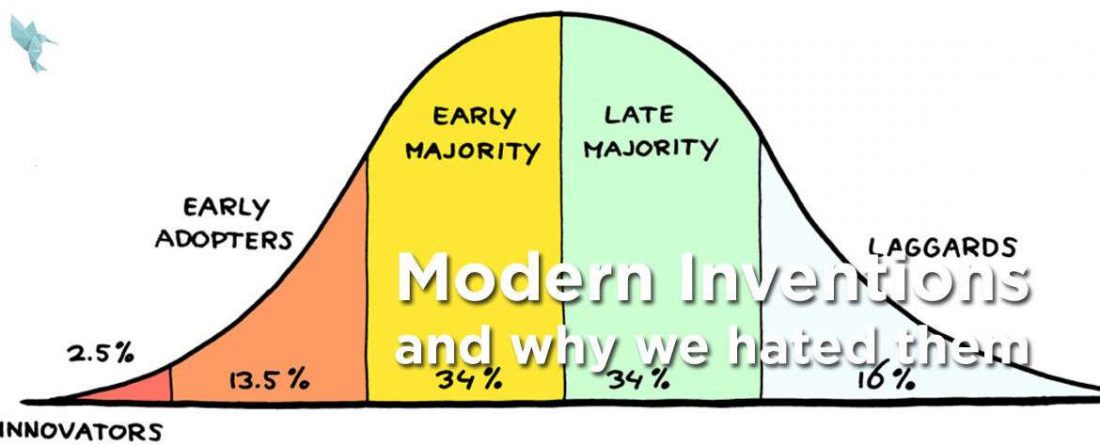
Modern Inventions and Why We Hated Them
The history of human invention and ingenuity has long been plagued with vilification and the more-than-often outburst of “That’ll never work!” in response to some new idea or another. Though the disdain was justified in many cases (cigarette umbrella, anyone?)1 , this post focuses on the inventions that warranted unnecessary criticism for their unconventionalism and derring-do. Luckily, we have survived these embarrassing slumps in human history and can wholeheartedly acknowledge the fact that many people rarely know what they are talking about when it comes to issues of progression, cultural or scientific. Let us begin the list with an invention that has become one of the most passionate hobbies of men and women worldwide (and has most likely increased the sex appeal of dirty, oil-stained overalls).
1. The Automobile
Ah yes, the car, as we modern humans now refer to it. Way back before Jeremy Clarkson was showing us all how to not drive our vehicles on public roads, the automobile was receiving some decidedly different attention (hint: the negative kind). In 1899, an issue of Literary Digest rather inaccurately predicted the staying power of the automobile, claiming: “The ordinary ‘horseless carriage’ is at present a luxury for the wealthy; and although its price will probably fall in the future, it will never, of course, come into as common use as the bicycle”.2 Literary Digest, clearly, was not the best at predicting things in general3 , and thus, the automobile went on to become one of the most common forms of transport in the world.
The next invention on the list is something modern humans would most certainly have trouble living without.
2. Electric Light
Probably even more essential to modern life is electric light, which was met with far more disdain at its outset than one would imagine. Before its exhibition in Paris in the late 1800s, Professor Erasmus Wilson of Oxford University had this to say about Edison’s world-changing invention: “[W]hen the Paris Exhibition closes electric light will close with it and no more be heard of”.4 Wilson, worryingly, was not the only one to dismiss Edison’s light bulb as nothing more than a misadventure, with Henry Morton, president of the Stevens Institute of Technology, exclaiming rather vehemently two years later: “Everyone acquainted with the subject will recognise it as a conspicuous failure”.5 Whether we should expect university professors and presidents of technology institutes to be on board with new ideas with clear potential is a wonderful topic for an entirely separate article. That being said, electric light revolutionised the entire world and led to countless other inventions and instances of human ingenuity. Let there be light!
The next section deals less with an invention and more with a cultural phenomenon. It is currently still growing worldwide, but has reached a stage where it can undeniably be considered ‘normal’. I am, of course, referring to online shopping.
3. Online shopping
The initial criticism of this phenomenon stemmed from a culture of inherent (and unfortunate) sexism. In 1996 (so recent?! you ask yourself, surely the 90s was a time of acceptance and equality! you continue, before remembering that that was nearly 20 years ago), TIME magazine proved that the decade was not in fact a golden age of white, middle class teenage angst and half hour sitcoms, but instead a decade still very full somewhat stale traditional views of women, stating very matter-o- factly: “Remote shopping, while entirely feasible, will flop – because women like to get out of the house, like to handle merchandise, like to be able to change their minds”.6 Perhaps I’m taking this quote entirely out of context and TIME wasn’t at all implying that women are troglodytic in nature. I’d have to ponder that theory more, in conjunction with the implication that we are also extremely indecisive, which is also in no way insulting. In any case, online shopping has taken the world by storm, and the practice has even extended to men! Colour me surprised.
So what?
So what, you ask? What is the point of this post? The point, dear readers, is that many common, entirely normalised things in our lives were not always so. It is a fairly predictable trend that new ideas, new inventions, and new things in general will be heavily criticised and scoffed at the time of their unveiling by the standard naysayers and nonbelievers of society, a.k.a. those unwilling to open their minds to new ideas and experiences. However, such things will pass, naturally, if the invention or idea in question can hold water. Indeed, we are glad we can confidently say that Queal has steadily become more and more accepted by innovators across Europe. So, to the early adopters and fearless experimenters out there, we salute you!
Sources
[1] Delana. Fantastic Failures: 10 wacky failed inventions from the past. Web Urbanist, Retrieved from http://weburbanist.com/2012/04/25/fantastic-failures-10-wacky-extinct-products-from-the-past/
[2] Sowden, M. (2008). 9 Life –changing inventions the experts said would never work. Ecosalon, Retrieved from http://ecosalon.com/9_life_changing_inventions_the_experts_said_would_never_work/
[3] Referring to the incorrect prediction of the 1936 presidential election: The Literary Digest. Wikipedia, Retrieved from https://en.wikipedia.org/wiki/The_Literary_Digest
[4] It’ll never work! Retrieved from https://www.lhup.edu/~dsimanek/neverwrk.htm
[5] Sowden, M. (2008). 9 Life –changing inventions the experts said would never work. Ecosalon, Retrieved from http://ecosalon.com/9_life_changing_inventions_the_experts_said_would_never_work/
[6] Modern inventions originally met with criticism. Rebel Circus, Retrieved from http://www.rebelcircus.com/blog/modern-inventions-originally-met-with-criticism/

No Comments